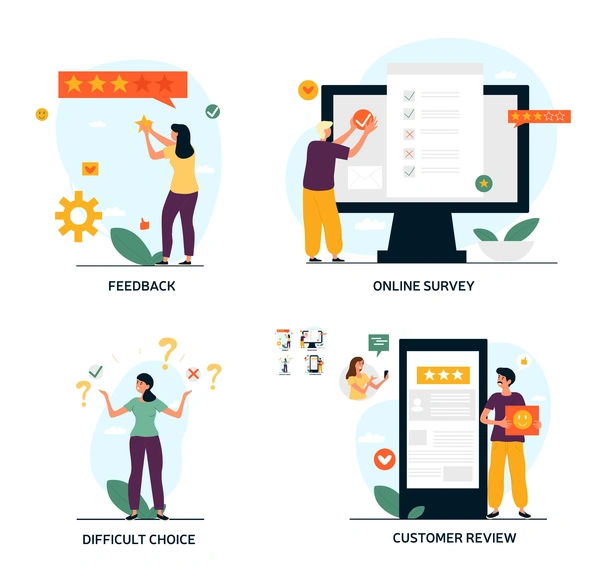Improving the Survey Experience for Respondents: Making Insights More Effective and Meaningful
The quality of insights derived from surveys is heavily influenced by the respondents’ experience
You might also like…
Why Qualitative Research is Essential in Market Research (and How EthOS Elevates It)
Discover why qualitative research is such an important part of market research and how OvationMR's tool EthOS can help. By: Anne Collins Date:...
Why AI Tools Built by Researchers Make a Difference
Learn more about AI-powered market research tools and why tools build by researchers for researchers are leading the charge. By: Erik Larson Date:...
Customer Survey Best Practices: Unlocking Insights Through Your Customer List
Learn how to leverage customer lists for market research. Explore best practices, address low response rates, and drive actionable insights. Date:...
Introduction
As market researchers, we know firsthand the power of surveys in capturing the opinions, preferences, and attitudes of a target audience. However, the effectiveness of these insights is contingent upon the quality of the data collected, which in turn relies on the survey experience of the respondents.

These days, as we observe attention spans dwindling and the competition for consumer insights gaining veracity, it is imperative for researchers to improve the survey experience for respondents.
With that goal in mind, we thought it was important to explore the significance of refining the survey experience and provide recommendations for making insights more effective and meaningful.
Why the Survey Experience Matters
The quality of insights derived from surveys is heavily influenced by the respondents’ experience. A positive survey experience increases the likelihood of receiving accurate, honest, and thoughtful responses, which in turn leads to more reliable and actionable insights.
Conversely, a negative experience can result in a range of issues, such as low response rates (non-response bias), unreliable data (missing data or invalid data), and misleading conclusions, ultimately compromising the usefulness of the research.
Creating a positive survey experience benefits the quality of the data and helps build and maintain relationships with respondents. When respondents feel respected and valued, they are more likely to participate in future surveys, providing researchers with a valuable pool of potential participants.
Recommendations for Improving the Survey Experience
- Simplify and streamline the survey design: The survey should be easy to understand and navigate, with clear instructions and a logical flow. Avoid using industry jargon or complex language that could confuse respondents. Use concise and straightforward questions, ensuring that they are relevant to the study’s objectives.
- Respect respondents’ time: Long, tedious surveys can lead to respondent fatigue, which can compromise the data quality. Aim to keep surveys short and focused, ideally taking no more than 10-15 minutes to complete. Additionally, provide respondents with an accurate estimate of the time required for completion, and consider offering incentives for participation.
- Optimize for mobile devices: With the increasing prevalence of smartphones and tablets, it is crucial to ensure that surveys are mobile-friendly. This involves designing the survey interface to be easily navigable on small screens and optimizing load times to minimize frustration.
- Personalize the survey experience: Personalization can help respondents feel more engaged and valued. Use the respondent’s name or demographic information to tailor questions and options, ensuring that the content is relevant to their interests and preferences.
- Allow for open-ended feedback: While structured questions provide quantifiable data, open-ended questions can offer invaluable qualitative insights. Provide respondents with opportunities to share their opinions and suggestions, which can lead to a deeper understanding of their preferences and motivations.
- Ensure privacy and confidentiality: Respondents are more likely to provide honest and accurate responses when they feel that their privacy is protected. Clearly communicate your data protection policies, and never share or sell respondent information without explicit consent.

Conclusion
At OvationMR, improving the survey experience for respondents is essential for generating effective and meaningful insights. By streamlining the survey design, respecting respondents’ time, optimizing for mobile devices, personalizing the experience, allowing for open-ended feedback, and ensuring privacy, researchers can foster positive experiences that produce better data and foster long-lasting relationships with respondents.
We must help our clients in this innovation process in a highly competitive landscape. The organizations that prioritize the survey experience will be better positioned to leverage the power of market research to drive informed decision-making and achieve their strategic objectives.
To Improve the Respondent Experience for Your Surveys
Follow
OvationMR

Bart Borkosky
Author
Bart is Chief Research Officer at OvationMR and is responsible for online panel and Online Sample Data Quality. He also consults with clients on sampling design for various types of online research campaigns. Bart can be reached at Bart.Borkosky@ovationmr.com
OvationMR is a global provider of first-party data for those seeking solutions that require information for informed business decisions.
OvationMR is a leader in delivering insights and reliable results across a variety of industry sectors around the globe consistently for market research professionals and management consultants.

Need help with new insights?
We are ready to offer you:


